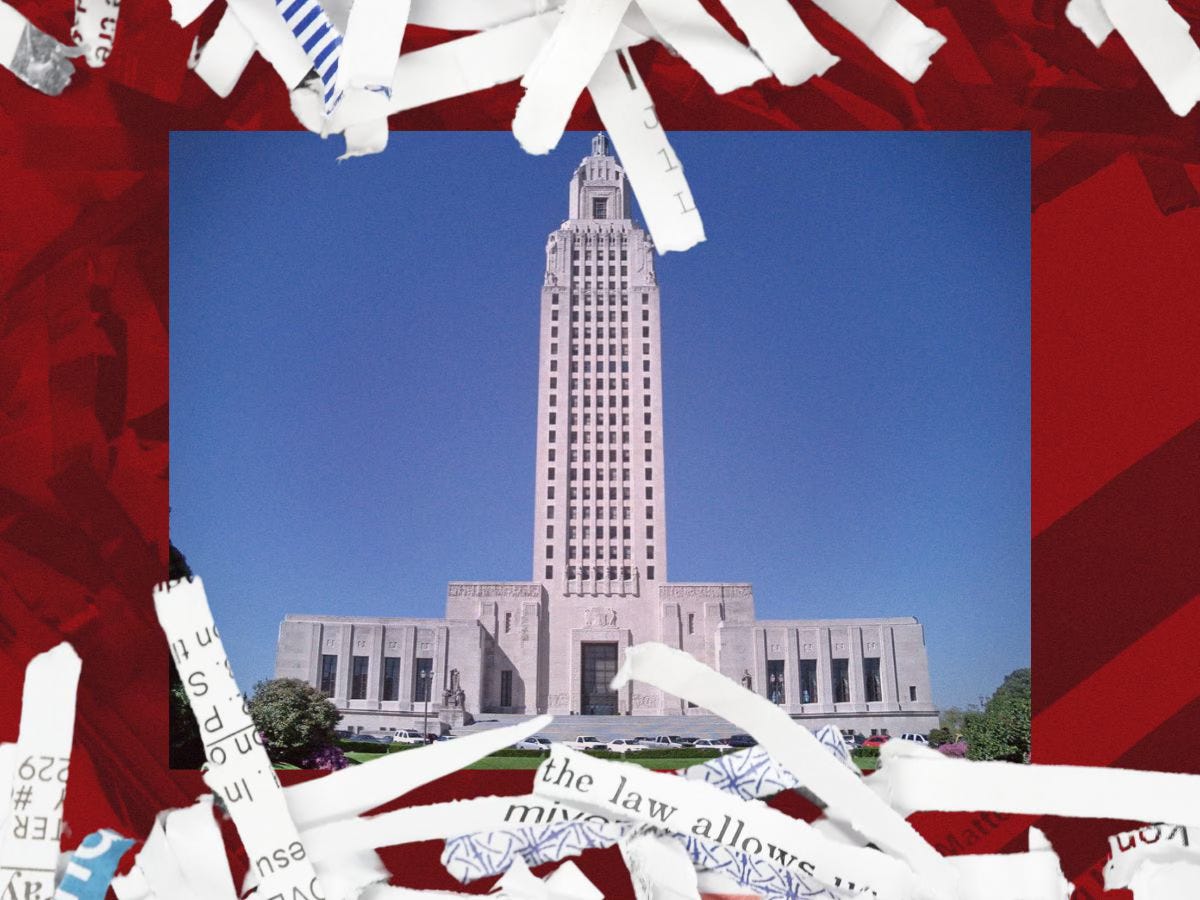Behind Closed Doors: Louisiana’s Dangerous New Transparency Law
By Shawn Wilson
Editor, The Bayou Insider
When governments change the rules quietly, it’s usually worth paying attention. And in Louisiana, a quiet but significant change just took place—one that threatens the very idea of public accountability.
In the name of “economic development,” Louisiana has passed a new law—Act 618 (originally House Bill 461)—that allows local officials to withhold key public records from taxpayers for up to two years. While it may sound technical or harmless, the consequences could be anything but.
If you believe in limited government, transparency, and the right of the people to know how their money is spent—this law should raise red flags.
What the Law Actually Does
At its core, Act 618 gives local executives like mayors and parish presidents the power to declare records confidential during economic development negotiations. It applies to projects worth $5 million or more, and once declared confidential, those records can be shielded from public view for up to 24 months—a full two years.
Here’s the breakdown:
12 months of initial secrecy with a possible 12-month extension
Applies to records tied to land purchases, incentive packages, infrastructure negotiations, and more
Requires a notice of confidentiality within 10 days, but not the actual details
Includes a sunset clause, expiring on January 1, 2028—unless extended
Supporters argue that this is about “protecting sensitive negotiations.” But critics—and especially conservatives—should be alarmed.
Why Conservatives Should Be the Loudest Opponents
1. It Undermines Government Transparency
For years, conservatives have fought to limit government power and promote fiscal responsibility. This law makes that nearly impossible by closing the books on how taxpayer dollars are negotiated, promised, or spent.
We’re talking about potentially millions in tax incentives, land use decisions, and infrastructure deals—all handled behind closed doors. That’s not transparency. That’s trust erosion.
2. It Centralizes Power in Local Executives
The law gives one person—your mayor or parish president—the authority to declare records off-limits. There’s no requirement for public hearings. No vote by a city council or governing board. Just a declaration. That’s a massive concentration of power—and a recipe for unchecked decisions that affect the whole community.
Conservatives believe in local control, but not local dictatorship. This law opens the door for unilateral backroom deals that bypass the people entirely.
3. It Distorts the Free Market
When deals are made in secret, businesses that are politically connected get an unfair advantage. Small businesses, entrepreneurs, and local competitors often don’t even know what’s happening—until the ribbon-cutting is done and the incentives are signed.
Conservatives should be deeply concerned when government picks winners and losers behind closed doors. The free market depends on openness, not special deals and whispered handshakes.
4. It Sets a Dangerous Precedent
Today it’s “economic development.” Tomorrow it could be public contracts, zoning changes, emergency spending, or educational policies.
Every time transparency is weakened in one area of government, it becomes easier to justify doing it somewhere else. This law creates a slippery slope that could undermine public access to the very documents that help prevent corruption, fraud, and mismanagement.
What It Means for Citizens
This isn’t just about legal jargon—it’s about your right to know.
If your town gives away tax incentives, buys land for a project, or enters into an expensive public-private partnership, you deserve to know what’s being offered and why.
This law says: “Trust us—we’ll tell you later.” But history tells us that trust without verification is how bad government flourishes.
Louisiana already struggles with a reputation for political corruption and lack of transparency. Shielding more records from the public only reinforces that reputation—and deepens the disconnect between elected officials and the people they serve.
What Can Be Done
Conservatives, journalists, watchdog groups, and citizens across the political spectrum shouldn’t accept this quietly.Here’s what we can do:
Demand voluntary transparency: Encourage local officials to go beyond the legal minimum and disclose as much as possible.
Push for reform: Advocate for amendments that shorten confidentiality periods, introduce oversight, and narrow the scope of the exemption.
Elect transparency champions: Hold your local leaders accountable and vote for those who believe the people should be informed.
Support independent media: Local watchdog journalism is the best defense against government secrecy.
Final Word: The Cost of Silence
This isn’t a debate about party lines. It’s about whether the government works for the people—or behind their backs.
Thomas Jefferson once said, “When government fears the people, there is liberty. When the people fear the government, there is tyranny.” Secrecy breeds fear. Transparency breeds trust.
We don’t need more backroom deals. We need bold leaders and active citizens who believe our state’s future should be built in the sunlight—not in the shadows.
🔎 Sources
Louisiana Legislature – House Bill 461 / Act 618 (2024)
Louisiana Illuminator – “Louisiana Lawmakers Approve Public Records Exemption for Economic Deals”
Public Affairs Research Council of Louisiana (PAR) – “Concerns About Public Records Transparency”
American Oversight – “American Oversight Condemns Louisiana HB 461”
Steeg Law Firm – “2024 Louisiana Legislative Update: New Laws That Affect Your Business or Home”
The Advocate – Local Legislative Session Reporting and Bill Analysis
Tension Grows Between Moon Griffon and Governor Jeff Landry Over Conservative Concerns
By The Bayou Insider Staff





